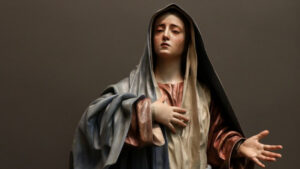
The role of the Blessed Virgin during the public life of her Son was totally hidden: a life of loving contemplation, prayer and sacrifice. An essential part of this sacrifice was her solitude.
The more deeply one contemplates this solitary life of Mary, the more one is astonished and shocked at the inexhaustible pain and the very many tears which our heavenly Mother united for our salvation with the sweat, toil and pain of Jesus in His public life.
At the death or absence of a loved one, the longer the cohabitation, the greater the intimacy, the harmony, the mutual understanding, and the more severe the trials endured together, the greater the suffering.
Separation, then, brings about the dissolution of a very dense fabric of habits, understandings and affections that were firmly established by countless familiar memories. As a result, the whole of life seems to lose its natural hold and to dissolve.
Let us think here of Mary’s intimate intimacy in the long years of Nazareth with her beloved spouse and the divine Son, who was “subject” to her until the age of thirty. One must bear in mind that otherwise children leave their father’s house much earlier.
For ordinary people, memories of the past fade with time, and this eases the pain. But how can one imagine this with such a profound soul as Mary’s?
People can turn their minds to other things and be absorbed by new impressions that facilitate this forgetting. But what on earth could attract Mary’s attention more than Jesus alone?
Usually the lonely have other people (children, relatives and friends) to comfort them. For Mary there was only Jesus, who was her everything. As for the relatives and friends, we learn from the Scriptures that they caused much suffering to Our Lady because of their unbelief.
Through her solitude during Jesus’ public life, the Blessed Virgin earned countless graces for us. She stands before us as Coredemptrix, deeply united in her sacrifices with the sacrifice of her Son’s life for our eternal salvation.


